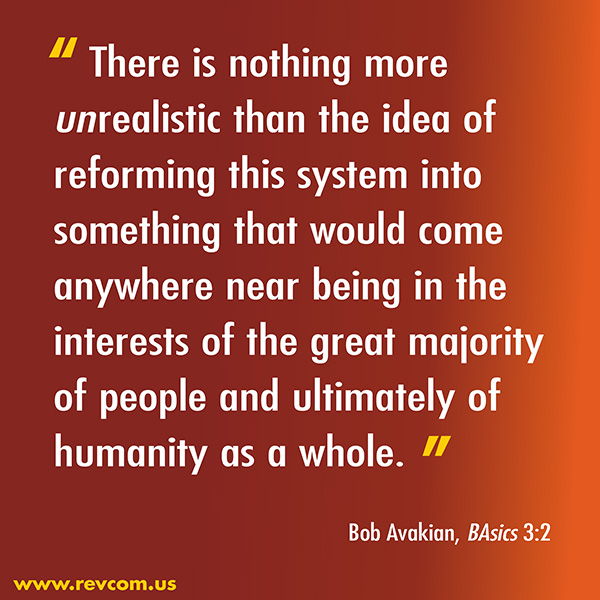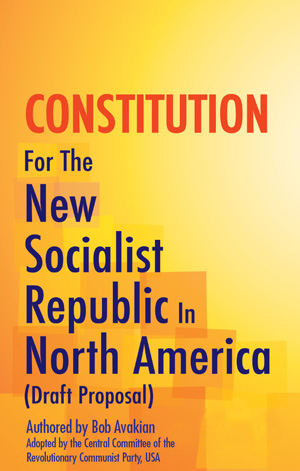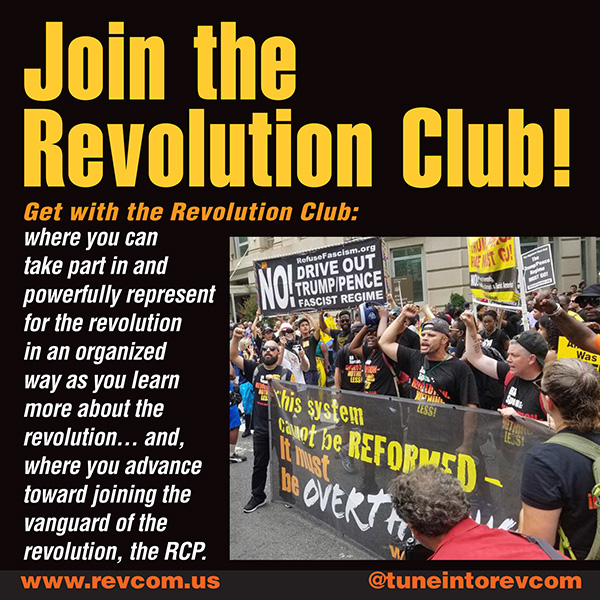From our readers:
Reform vs Revolution at a West Coast Climate Conference
| Revolution Newspaper | revcom.us
Members of the Revolution Club, LA went to a conference at UC Irvine called Fire and Ice: The Shifting Narrative of Climate Change. The conference, attended by about 500 people, featured well known activists and authors against climate change like Bill McKibben, initiator of 350.org; Elizabeth Kolbert, author of The Sixth Extinction; and Nathaniel Rich of the New York Times.
Through our interventions and impact, we repolarized to where a central question at the conference was reform or revolution. Various speakers felt compelled to speak to that question from the stage, and our interventions drew clear lines that repelled some and drew in others who were either curious or appreciative of the sharpening of the terms.
In preparation for the conference, we looked at the content of what the speakers had been saying, we looked at how the question of the environment was shaping up on the terrain, and we made a hypothesis that the main thing we would have to struggle over to really stir things up in a good way was the Green New Deal. We prepared ourselves for ideological battle by writing a short one page polemic with simple analysis and clarity, and this made all the difference: “The Green New Deal: Sustainable Snake Oil for a Green American Empire.”
The audience was made up mostly of older white liberals and academics, not many students attended, and people were really agonizing about the state of the planet and the effects of climate change. Most people at the conference, especially McKibben, said, if we could only pressure Congress and get some campaign finance reforms we could actually stop climate change.
Some speakers emphasized the social justice aspects of the Green New Deal. One person upheld it for being “intersectional” and overall it was presented as being capable of overcoming all forms of inequality because of its focus on disadvantaged and marginalized communities!
The first day McKibben presented and really pushed the Green New Deal and Alexandria Ocasio-Cortez as the solution to climate crisis. Repeatedly he and others posed the problem as “Big Oil’s influence in politics.”
Our intervention during McKibben’s speech and the Q&A portion put forward the basic position in the polemic—the Green New Deal is nothing but a better business plan for a Green American Empire, that peddling this as the solution is driving people right back into the jaws of the system that caused this mess, locking people in the voting booth as the planet burns—we need revolution to really deal with the climate crisis. McKibben spoke to the question from the stage, and acknowledged that we were supporters of the Revolutionary Communist Party (RCP), led by Bob Avakian. He said he thought it was possible that Bob Avakian and the RCP very well may have the only solution to the climate crisis, but that he really doesn’t think that is the case. He went on to say that the RCP hasn’t really gotten anywhere and “we don’t have time for ‘impractical’ solutions like revolution.”
We didn’t get the chance to respond to this, but after the Q&A people came up to debate us and to get clarity on the difference we were speaking to. A dozen or so people were visibly flustered and upset. Some thanked us for the intervention or wanted to know more, but the line was clearly drawn with real substance.
We came back the next day with sharper agitation, having summed up the night before that we had to hit at the American chauvinism and the idea that we could use the institutions of the state to solve the crisis as part of speaking to the question that revolution is something we need to go to work on NOW.
The impact of our agitation the previous day rose to the surface. Nathaniel Rich of the New York Times spoke on writing the Times special issue on the environment. Within his speech he polemicized against revolution several times. After this speech, handfuls of the conference were reading our polemic, and several people came straight up to us to ask what this is about and why we weren’t for the Green New Deal, and what we propose as the solution. An organizer of the conference even came up and begrudgingly thanked us for our “heckling” the day before saying that they thought that it advanced the conversation.
Other speakers were putting forward different ideas about climate change, presenting important scientific work, but when it came to proffering solutions, most everyone believed or really wanted to believe the Green New Deal would solve it. There were some important skeptics raising questions about the impact of the Trump/Pence regime’s rollback on regulations, about complications of applying national policy to try and mitigate a global problem (regulations in imperialist countries lead to African countries consuming the dirtiest oil), and about whether the raw materials for these solar panels and things would still come from the exploitation of the people of the world.
The last panel was about the law, activism, etc., basically giving people a way to act. The panelists were talking about the Green New Deal and recognizing the need to combat various ideological barriers to our ability to deal with climate change, including the individualism, consumerism, etc. The person who stood out most though came straight out with some basic materialism about the Green New Deal—he laid out the fact that fossil fuels are so integrated into the global system of production that you would not be able to implement this without wreaking havoc on the whole global economy. He said capitalist competition will not be able to deal with this and nothing can deal with this in the framework of time that we have except a planned economy. This was very good, and the intervention we did here was along the lines of “the biggest delusion plaguing this conference is that you can somehow use the murderous institutions of this system to change anything in the interests of humanity... these institutions are what back up capitalism all over the world—they have to. Yes, we need a planned economy but in trying to carry that out, you will come up against the power of the state which is why you need an actual revolution.” No one really spoke to that question except the guy who talked about a planned economy, and he just kind of skirted over it calling the Democratic Party imperfect, and agreeing you will need to deal with “militarism.”
Looking back, there is more back and forth contention we could have done, but with what we did do, we became a force to contend with at the conference. We were a magnet for people who were working through different kinds of questions. Working as a team of scientists was critical in this. We summed up every intervention and tried to identify how to make the next one sharper, and figure out what were the questions that needed to be spoken to. Having the short polemic ahead of time played an essential role, including leaving people with the basic argument who heard pieces of what we were saying from the floor. A lot of people responded to us in contradictory ways, with a lot of people challenged by what we were putting forward. Many people were vacillating between delusional unscientific hope and soul crushing cynicism and defeatism. Among a few people there was clear existential panic. People were really weighed down by the severity of this crisis and the seemingly impossible odds to stop it.
We want to do better in the future at not just promoting revolution, but bringing it more to life as an active goal to strive for. Partly this means doing better at having it out over what is really practical and what is not, in terms of solving this terrible problem; and partly this means doing better at giving people ways to act and be part of this, now, in ways that move that possibility closer. But even with that, we feel that we learned, and transformed, a lot through this experience.
Get a free email subscription to revcom.us:





